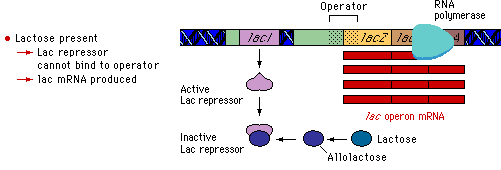How does lactose affect the functioning of the lac operon?
1 Answer
Lactose is enables the transcription of the genes in the lac operon by turning off the repressor.
Explanation:
In the absence of lactose, a repressor binds to the operator-site of the lac operon. The RNA-polymerase is therefore unable to bind and transcription of the lac genes can't take place. This is called negative regulation.

When lactose is present in the cell, an isomer called 'allolactose' is formed. Allolactose binds to the repressor which causes a conformational change. As a result, the repressor can no longer bind to the operator region and will be released. Now, the RNA-polymerase can bind and transcribe the lac genes.

This makes sense, because the genes in the lac operon code for enzymes that metabolize (allo)lactose. These enzymes are only required when lactose is present. The breakdown of (allo)lactose will eventually lead to the release of the repressor which stops the synthesis of the lac enzymes.

